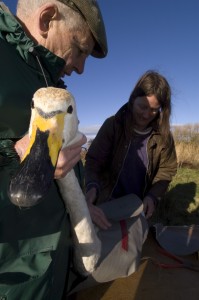WWT chairs global swan conservation effort

WWT’s Head of UK Waterbird Conservation Eileen Rees has accepted the role of Chair of a global network of swan specialists working on the monitoring, research, conservation and management of swan populations.
Eileen’s knowledge spans four decades of swan research. She’s one of WWT's specialist Bewick’s swan researchers who've learned to recognise hundreds of Bewick’s swans by their individual face markings. The 50-year face-recognition study has revealed the previously unknown family relationships and behaviours of generations of Bewick’s swans.
The global Swan Specialist Group which Eileen will chair is overseen by international environmental organisations Wetlands International (WI) and the International Union for the Conservation of Nature’s (IUCN) Species Survival Commission.
Through Eileen’s long-term involvement with the Group, WWT has helped prepare the Bewick’s Swan Action Plan, which aims to stop and reverse the decline in numbers of the North West European Bewick’s swan population. It was adopted by the African-Eurasian Migratory Waterbird Agreement (AEWA) in 2012.
Eileen said:
“I’ve dedicated much of my life to understanding the conditions encountered by these beautiful creatures, and to promoting their conservation. Information exchange is crucial for enhancing their survival, so I’m proud to take on this role in bringing the world’s experts together.
“It’s also a special role for WWT because WWT has always been about combining cutting-edge wildlife research and inspiring people. Our Bewick’s swan study began with Sir Peter Scott and his daughter Dafila painting swans outside their window at Slimbridge. Over the years the swans’ life-histories have delighted generations of visitors to WWT’s Wetland Centres.
"Many swans cross international boundaries, so it’s only through international co-operation that we can protect them effectively. The Swan Specialist Group helps swan researchers, conservationists and international organisations to work together on joint solutions for the swans and for the important wetland habitats they rely on.”
You can see a range of swan species at WWT Wetland Centres - see the Bewick's swans in our collections at Slimbridge, London, Martin Mere, Arundel and Llanelli and wild Bewick's swans every winter at Slimbridge and Welney (plus the odd one at Martin Mere and Arundel). You can also adopt a wild swan here.
Chairing the Swan Specialist Group is just one of the conservation roles for which WWT is the global leader. These include Wetlands International / IUCN SSC roles as:
- Duck Specialist Group – Chair
- Flamingo Specialist Group – Chair
- Threatened Wildfowl Specialist Group – Chair
- Freshwater Plant Specialist Group – Host
- Waterbird Harvest Specialist Group – Board Member
Wetlands International is an international organisation that works alongside charities like WWT to protect and restore wetland habitats, their resources and biodiversity. Founded in 1948, IUCN is the world’s first global environmental organisation. The SSC is one of IUCN’s six expert commissions and was established in 1962 as a science-based network of biodiversity experts, with WWT founder Sir Peter Scott as its founding chair. Scott also conceived the IUCN Red List which designates the threatened status of individual species.
Eileen Rees was invited by Wetlands International and IUCN SSC during 2013 to serve as acting Chair of the Swan Specialist Group, and the role was unanimously approved by Swan Specialist Group members during the 5th International Swan Symposium held in the USA in early 2014. The first workshop on the implementation of the Bewick’s swan Action Plan was also held during the Symposium, at which it was agreed that WWT would host the Co-ordinator of the AEWA International Expert Group, which is taking forward implementation of the Bewick’s swan Action Plan.
